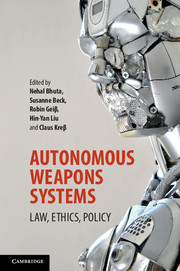Book contents
- Frontmatter
- Contents
- List of contributors
- Acknowledgements
- PART I Introduction
- PART II Meanings of autonomy and human cognition under automation
- PART III Autonomous weapons systems and human dignity
- PART IV Risk, transparency and legal compliance in the regulation of autonomous weapons systems
- PART V New frameworks for collective responsibility
- PART VI New frameworks for individual responsibility
- 13 Autonomous weapons systems: new frameworks for individual responsibility
- 14 Refining responsibility: differentiating two types of responsibility issues raised by autonomous weapons systems
- PART VII Conclusion
- Index
13 - Autonomous weapons systems: new frameworks for individual responsibility
from PART VI - New frameworks for individual responsibility
Published online by Cambridge University Press: 05 August 2016
- Frontmatter
- Contents
- List of contributors
- Acknowledgements
- PART I Introduction
- PART II Meanings of autonomy and human cognition under automation
- PART III Autonomous weapons systems and human dignity
- PART IV Risk, transparency and legal compliance in the regulation of autonomous weapons systems
- PART V New frameworks for collective responsibility
- PART VI New frameworks for individual responsibility
- 13 Autonomous weapons systems: new frameworks for individual responsibility
- 14 Refining responsibility: differentiating two types of responsibility issues raised by autonomous weapons systems
- PART VII Conclusion
- Index
Summary
Introduction
The development of autonomous weapons systems (AWS) poses unique challenges for the attribution of individual responsibility. Criminal responsibility generally takes the individual human person as the central unit of action and the appropriate object of blame when things go terribly wrong. This assumption comes under strain, however, in numerous circumstances: when the unit of action is a collective (such as a group of persons, a corporation or a state), when the object of blame is a non-human entity (a dangerous animal or a corporation/state) or when the object of blame is not the sort of entity that can be subject to responsibility (these are typically cases of exemptions from criminal responsibility, such as in the case of minors or the insane). Responsibility for the actions of AWS implicates issues common to these situations.
The actions of an AWS, being partly of the character of a weapon and partly the character of the combatant, will be enmeshed to a great extent within the actions of human agents acting together, leading to overlapping claims of responsibility. Attribution of responsibility to the AWS itself will be difficult not only because it has ‘no soul to be damned and no body to be kicked’, but, arguably, also because it lacks capacity to act in a manner deserving of criminal liability. At the same time, because of the unique features of an AWS, several human agents might be potential candidates for legal responsibility for its conduct. As UN Special Rapporteur Christof Heyns notes, these could include ‘the software programmers, those who build or sell hardware, military commanders, subordinates who deploy these systems and political leaders [who authorize them]’.
By its very nature, the AWS will engage in conduct that is inherently unpredictable and dangerous. The question then is if an AWS engages in conduct that violates the laws of war, or if it commits an international crime due to malfunctioning, faulty programming or incorrect deployment, who can or should be held responsible for this violation? There is no single account of responsibility under which the various individuals performing diverse functions in relation to the AWS may be held liable. It may be possible, however, to conceive of their actions as creating a web of overlapping chains of responsibility, both criminal and civil in nature.
- Type
- Chapter
- Information
- Autonomous Weapons SystemsLaw, Ethics, Policy, pp. 303 - 324Publisher: Cambridge University PressPrint publication year: 2016
- 3
- Cited by



